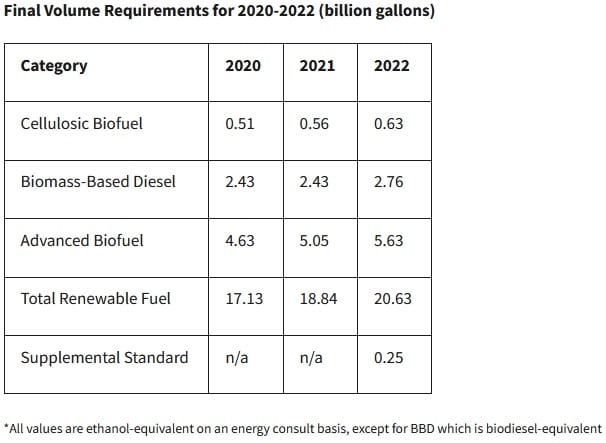U.S. EPA Finalizes 2022 Renewable Fuel Standards

The U.S. Environmental Protection Agency on June 3 announced a slew of measures to bolster the Renewable Fuel Standard, or RFS, program in pursuit of climate goals set out in the Clean Air Act. The final standards require blending of 20.63 billion gallons of renewable fuels into gasoline and diesel this year, slightly lower than the 20.77 billion gallons the agency proposed in December.
The agency’s notification has four important focus areas. Readjusting the renewable fuel volumes under RFS, final decision on petitions for Small Refinery Exemption and recognition of renewable biodiesel made from canola oil as advanced biofuel under the program. This initiative also brings bio-intermediates within the regulatory framework while ensuring environmental and legal safeguards are in place.
Two big changes in this ruling pertain to supplemental obligation and allowing biointermediates to be included in the RFS program. Biointermediates refer to feedstocks partially converted at a facility, and then processed to qualify for the RFS program. EPA confirmed a 250-million-gallon supplemental obligation to the volumes finalized for 2022 and stated its intent to add another 250 million gallons in 2023, to address the remand of the 2014-2016 annual rule by the DC Circuit Court of Appeals in Americans for Clean Energy v. EPA.
The RFS program encourages the production of low greenhouse gas renewable fuels, which are a crucial element of addressing climate change through transportation policy. Renewable fuels can be categorized as conventional fuels (starch feedstocks) and advanced biofuels (cellulosic & biomass-based fuels). Enhanced renewable fuels production helps achieve energy security, climate change goals, robust rural economies and boost cross sectoral growth. EPA is required to reset annual renewable fuels volumes requirements based on review of RFS program implementation and other environmental & socio-economic factors.
As per EPA estimates, this action will reduce the imports of crude oil and refined products by approximately 2.9 billion gallons resulting in $227 million of energy security benefits. This figure could be higher as this estimate does not consider military cost changes to U.S. imports of crude oil and refined products.
Response from industry participants has been generally supportive of these new regulations. The National Corn Growers Association noted that increased RFS volumes for 2022 and denial of pending refinery exemptions will reduce GHG emissions and move renewable fuels forward. Growth Energy applauded President Biden and his EPA for this action, which will set the direction of total and advanced renewable fuel volumes for 2023 and beyond. The Renewable Fuels Association observed that the RFS is being put back on track. Iowa Corn Growers Association said that this is a step in the right direction and drivers will have more cleaner, affordable, home-grown ethanol in their tanks.
EnerKnol Pulses like this one are powered by the EnerKnol Platform—the first comprehensive database for real-time energy policy tracking. Sign up for a free trial below for access to key regulatory data and deep industry insights across the energy spectrum.
ACCESS FREE TRIAL